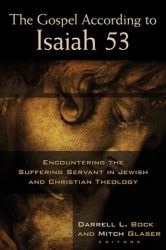Few chapters in the Bible are more familiar to the Christian ear than Isaiah 53 (Is. 52:13-53:12), and certainly few are more beloved. And judging by the number of quotations and allusions to it we find in the New Testament, this has long been the case!
There have of course been other books dedicated to this passage of Scripture, but The Gospel According to Isaiah 53 by Darrell Bock and Mitch Glaser (eds.) does have its own contribution to make. If you’re intending to study this wonderful passage of Scripture in any depth, then this is a must read book. Darrel Bock is here to give us just a taste of what they offer.
Fred Zaspel:
First, tell us about this book and how it came about – how is it unique? What are your goals? How is the book structured?
Bock:
 We perceived a need for a detailed treatment of Isaiah 53, which is a significant text in sharing about God’s program to Jewish people who question the idea of a Messiah who suffers. It is a careful look at Isaiah 53 in its OT context as well as in Jewish interpretation and its use in the NT.
We perceived a need for a detailed treatment of Isaiah 53, which is a significant text in sharing about God’s program to Jewish people who question the idea of a Messiah who suffers. It is a careful look at Isaiah 53 in its OT context as well as in Jewish interpretation and its use in the NT.
Zaspel:
In broad terms, at least, describe for us the “Servant” of the Lord as he is presented in the book of Isaiah.
Bock:
Well that depends on where you are in the Servant Songs. It is Israel as a nation in some texts such as Isaiah 49, but when we get to Isaiah 53, It has narrowed down to an individual who can deliver on what Israel has failed to be as Servant.
Zaspel:
What indications are there in Isaiah that the Servant of the Lord is a personal and not only a corporate figure?
Bock:
The idea of being a sacrifice and the first person language on behalf of his own points to an individual, not a corporate figure for Israel. The perspective looking at outside kings (note the “them”) is not the nations speaking, but a perspective from within Israel. This makes the “we” Israel speaking about he Servant. The rebellion of his own people caused him to suffer. All these point to an individual who goes through what he does on behalf of his people.
Zaspel:
What considerations lead us to understand the “Servant” as Messianic?
Bock:
The context of the book of Isaiah as a whole points to a Messianic figure for he both proclaims and brings deliverance according to Isaiah 61:1-2. The first part of Isaiah (chapters 1-39) also looks for a king as the key figure (see especially Isaiah 7-11).
Fred Zaspel:
In terms of the identity of the Servant, was there a common interpretation of Isaiah 53 among the Rabbis before the time of Christ, a general consensus? Did they understand it as Messianic?
Bock:
Though some Jewish rabbis saw an individual, most interpret it either as Israel or as a remnant in Israel. They di not see the text as messianic. This explains why some were slow to understand the idea of a suffering Messiah.
Fred Zaspel:
Is there a common interpretation among the Rabbis and Jewish theologians today?
Bock:
No. It runs very much like the older rabbinic options.
Zaspel:
How might we best use Isaiah 53 in Jewish evangelism?
Bock:
The simplest way is to hand a Jewish person the text or read it to them and ask who does this sound like. Many Jewish people do not know about this text as it is not read regularly in the synagogue. So this is a way into a conversation. If they do not know or have a suggestion you can still make the connections to Yeshua (the Jewish name for Jesus).
Zaspel:
Isaiah 53 reads like a lament, a confession of those who rejected the Servant and now understand better. Who is the “we” that express this lament? And is there a specific time-frame in view?
Bock:
This seems to be from a “prophetic” perspective of a group within Israel. The kings are “them” and it is what “we” did to him that is lamented. There is no specific time frame in view. It is simply clear he provides a way for deliverance. The description fits Jesus of Nazareth very nicely.
Buy the books

THE GOSPEL ACCORDING TO ISAIAH 53
